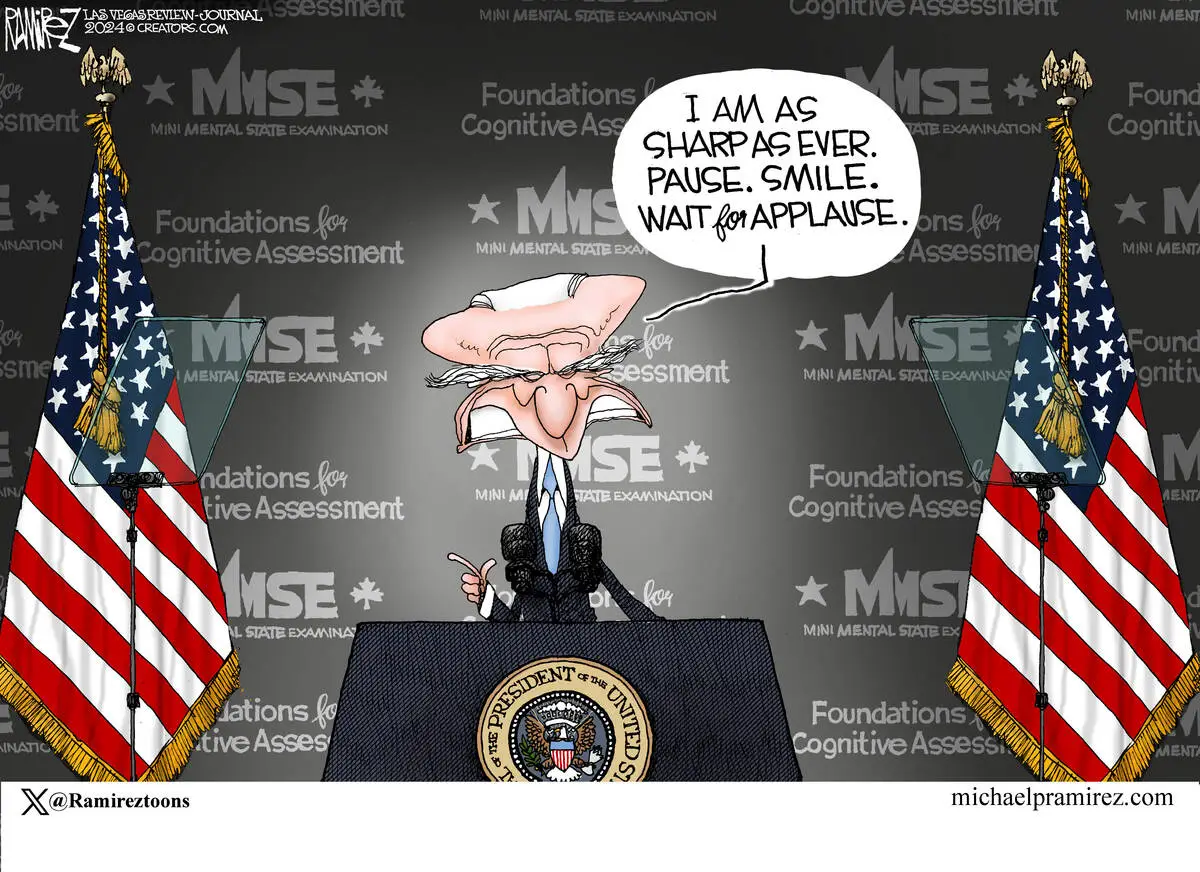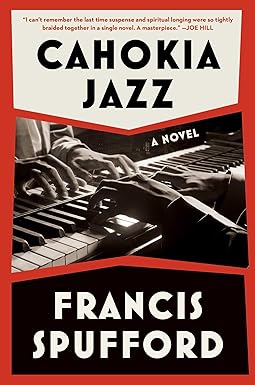President Dotard's increasing signs of unawareness and detachment from reality don't seem to have hurt him with the bettors:
| Candidate | EBO Win Probability |
Change Since 4/21 |
Phony Hit Count |
Change Since 4/21 |
|---|---|---|---|---|
| Joe Biden | 45.6% | +0.1% | 616,000 | +185,000 |
| Donald Trump | 43.8% | +0.2% | 3,660,000 | +1,120,000 |
| Robert Kennedy Jr | 3.6% | unch | 29,700 | +9,000 |
| Michelle Obama | 3.2% | +0.2% | 170,000 | +67,000 |
| Other | 3.8% | -0.5% | --- | --- |
Fun fact: the Stossel/Lott betting-odds site also tracks the bets placed on the GOP VP nominee. If you really want to see a precipitous drop in probability, check what's happened to Kristi Noem's odds in the past few days.
What is it with politicians and dogs, anyway?
Also of note:
-
Equal time. We've been pretty hard on President Wheezy recently. So just a reminder that the Other Guy is no prize either. Jeff Maurer brings us The Trump Trial Opening Arguments, But With Jokes. (Subhed: "'Trump's just sleazy' is the DEFENSE")
[The prosecution's] starting point was a 2015 meeting between Trump, Michael Cohen, and National Enquirer publisher David Pecker, who has the porn-y-est name in this story despite the fact that it involves an actual porn star. In that meeting, the trio allegedly discussed how the Enquirer might help Trump, which provided the trial’s first bombshell: The National Enquirer might not be a trustworthy source of news. This was a shocking charge against the august publication that broke landmark stories like The 20 Worst Beach Bods of 2009 and I’m Being Haunted By Lucille Ball’s Ghost. In much the same way that Watergate testimony shed light on unsavory aspects of the Nixon White House, this trial has revealed that the publication that tried to tie Ted Cruz to the JFK assassination might be politically motivated.
The prosecution alleges that the trio discussed a “catch-and-kill” system that worked like this: If someone claimed to have dirt on Trump, the Enquirer would buy the story, not publish it, and Trump would pay them back. It’s like when a movie studio buys a script from a talented writer, doesn’t produce it, and instead makes Harry and the Hendersons 2: Squatch in the City. But this plan would have a nefarious purpose: It would seek to keep voters from thinking that Trump is a lecherous, philandering pervert. Even though that’s exactly how Trump portrayed himself for 30 years prior to the meeting.
The alleged plan worked well at first: Pecker is said to have squashed a story from a doorman who said that Trump fathered a child out of wedlock. That story could have been damning to Trump, because if he has an unknown child, then why does he keep running duds like Don Junior and Eric in front of the camera? The plan eventually faltered, though, because Pecker failed to account for the fact that Donald Trump is the cheapest bastard who ever walked God’s green Earth. After Pecker secured the rights to Playboy model Karen McDougal’s story for $150,000, Trump didn’t pay him back. The catch-and-kill plan floundered, though it would still prove to be by far the most effective program of Trump’s political life.
You know who would have paid back Pecker? Nikki Haley, that's who.
-
They call me Mister… Kevin D. Williamson has a bone to pick with titles: Mr. Trump in Court.
Todd Blanche, one of the unhappy attorneys defending Donald Trump in one of the criminal actions against him, insisted this week the former president deserves to continue to be called “President Trump” out of respect, that this is something the former game-show host and quondam pornographer “has earned.” That is pure drivel, of course, but Trump, who has a thing about titles, has insisted for years that employees and sycophants continue calling him “President Trump.”
The continued use of the title “president” before Trump’s name is, of course, a violation of republican norms. We do not have aristocratic titles in the United States—we have job titles, and we have only one president at a time. (Goodness knows one is enough.) Trump isn’t the first ex-president to cling pathetically to the title, though Trump’s insistence takes on a special valence because he also insists that he is the rightfully elected president and attempted to stage a coup d’état in 2021 to hold onto the office. So there is more at work here than etiquette.
Perhaps most hurtful of all:
Nikki Haley is still “ambassador,” as though she were an envoy from some faraway planet where Republicans didn’t suck quite so badly.
(Classic movie quote here.)
-
We used to call this a "reality distortion field". Charles C. W. Cooke observes, sagely: Donald Trump Is Now Whomever His Critics and Backers Need Him to Be. I'm out of gifted NR links this month, so read what you can, or, better, subscribe:
It is fitting, perhaps, that a man who launched his reelection campaign by transmuting himself into a series of gaudy nonfungible tokens would eventually be transformed into an avatar. Donald Trump has long served as a Rorschach Test, but, as he heads undeterred into his third bid for the presidency, he has become something more protean besides. At this stage, there are thousands of Trumps, each tailored to the predilections of the observer. Trump is a myth, an archetype, an emblem. How can it be that a country full of people who speak the same language cannot agree on the elementary facts that attach to the man? Simple: Because each involved in the debate has pulled a different trading card from an increasingly extensive pack.
Take the question of Trump’s involvement in the recent bill that provided $60 billion in military aid to Ukraine. There, the plain details are these: Rather than emphatically oppose further funding for Ukraine, Donald Trump submitted that “Ukrainian survival and strength . . . is also important to us”; rather than attempt to sink it behind the scenes, Trump contrived the idea that the aid should be cast as a “loan” — an idea that was adopted, and that proved crucial to its passage; rather than criticize Speaker Mike Johnson for his role in shepherding the package through the House, Trump said publicly that Johnson is a “good person” and “a good man,” who is “trying very hard.” Given his previous rhetoric, it is unclear precisely why Trump did and said these things, but do and say them he most decidedly, indisputably, unequivocally did.
Or, at least, the real Donald Trump mostly decidedly, indisputably, unequivocally did. The fictionalized versions of Trump did whatever those writing about him needed him to do. Thus far, two fabricated variations of the man have emerged. One, as contrived by his enemies, fought desperately against more help for Ukraine. The other, as contrived by his fans, did nothing worthy of critique. And never the twain shall meet.
CCWC notes, amusingly, that a Bill Kristol commentary on Trump "made no attempt to hide that it had been written backwards from its foreordained conclusion". I read a lot of stuff like that, the light only slowly dawning on me that I've been wasting my time.
-
Getting back to phoniness… Yes, I used to call this Sunday feature "The Phony Campaign". But now phoniness is the water we goldfish swim in, so it's not so much a revelation any more.
But here's a WSJ commentary of a pol who vanished from our radar last month. Kenneth L. Khachigian wonders: What Ever Happened to Gavin Newsom?
‘Where have you gone, Joe DiMaggio?” If Simon & Garfunkel were political pundits they might ask: Where have you gone, Gavin Newsom? When Joe Biden’s stumbling, mumbling fortunes seemed to slip away, the left crowned Mr. Newsom as the obvious heir to the throne. It was near impossible to click on a link or touch the remote without seeing him romp across America, preaching California’s acceptance of abortion or flying off to China to shake hands with Xi Jinping.
But Mr. Newsom never knew where to draw the line on primping. When he hired a portrait photographer to accompany him to China and take pictures of him at the Great Wall, even the left-leaning Politico magazine couldn’t refrain from lampooning his portrait, as he attempted to look presidential at a faux Asian summit.
The staged visit exposed the governor’s most fatal political flaw—his lack of authenticity. That phony factor is one he can’t escape and was summarized in a recent exposé by the nonprofit news organization CalMatters: “Governor Newsom has long touted his baseball career, including that he played at Santa Clara University. But he was never on the roster, among other misperceptions of his accomplishments. Newsom hasn’t corrected his record.”
And, given the competition, why should he?
| Recently on the book blog: |


![[The Blogger and His Dog]](/ps/images/me_with_barney.jpg)



